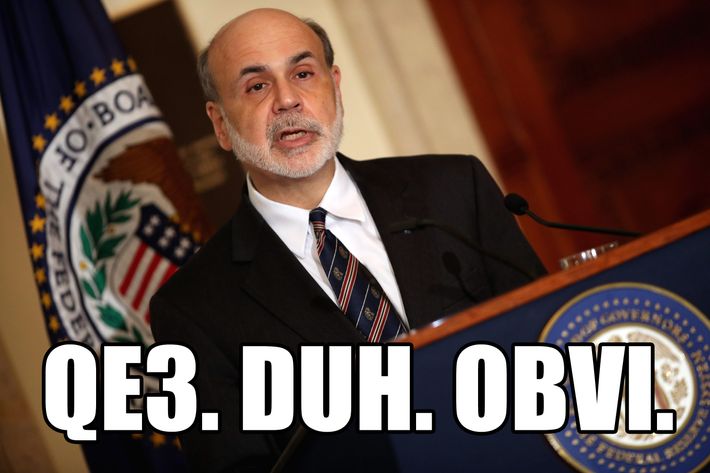
Whether you are a Chanel-clad jet-setter or a Birkenstocks-clad backpacker, it’s time to start thinking about a long European summer vacation. Due to a strange alignment of the monetary-policy stars, there hasn’t been a cheaper time to go to the Continent in more than a decade: Of late, the dollar has soared in value relative to the euro, making it a great time to make money here and spend it there.
It’s not just a nice coincidence for people looking for a culturally rich holiday, either. It’s a lesson in crisis-fighting. Europe is cheap for Americans right now because Europe has only recently adopted the United States’s recession-fighting monetary-policy playbook, after years of refusing to do so. When you’re booking that hotel in Dubrovnik, thank Ben Bernanke.
What does he have to do with your vacation plans? Well, a divergence in the two areas’ economic fortunes and monetary policy is driving the exchange-rate fluctuations, with a euro that cost $1.38 a year ago costing $1.07 now. On this side of the pond, the Federal Reserve has ended its enormous asset-purchase program and is preparing to raise interest rates. The United States’s unemployment rate is at 5.5 percent, and growth is strong enough at 2 or 3 percent. As such, the greenback is in high demand. In Europe, on the other hand, central banker Mario Draghi has finally committed to a trillion-euro easing program. The whole currency area’s growth rate is a piddling one percent or so, and its unemployment rate is still more than 11 percent. (Unemployment has never been that high in the United States in the postwar period.)

The context for those statistics matters. The United States tackled its recession early and aggressively, with a huge direct stimulus package followed by massive monetary stimulus. Growth got good enough and unemployment got low enough that it is now ratcheting back, with the side effect of pushing up the value of the dollar. Europe is another story. Its progress on fixing its periphery-country debt crises has been excruciatingly slow. Growth has never really picked up. Only in the past few months has Draghi decided to open up the euro firehose to help.
That means expensive dollars and cheap euros, and it means you should book that hotel — it really is remarkable how much the prices have shifted. To demonstrate, let’s plan a vacation. We’ll start at the site of the ongoing tragedy that is Greece. A villa here looks like it would suit our purposes, perhaps one with a private pool. Such accommodations are currently going for €4,809 a night. That would have cost us nearly $7,000 last year, but it will cost us a mere $5,000 now. And let’s consider putting down some roots. This lovely chateau near Paris is built on the site of a “Gallo-Roman villa.” It has a spa, two staff houses, a massive wine cellar, an orangery, and plenty of land for olive-oil production, which sounds like the sort of thing I could get into. At this time last year, it would have cost nearly $15 million; today it costs less than $12 million. A steal!
The cheap stuff is cheaper now, too. A month-long adult-fare Eurail pass is currently going for €983. When the euro was strongest against the dollar, right before the global financial crisis, we would have needed $1,563 to buy it. Now we need just a bit more than a thousand bucks. A €1 baguette would have cost us $1.40 or so a year ago; now we only need a dollar, a nickel, and a couple pennies. Ditto for a €50 apartment in Berlin — it’s just $53.50 or so now. You could almost afford to move there.
And it looks like we might be even better off waiting to take our dollars abroad. A number of forecasters expect the two currencies to hit the point of parity soon. And Goldman Sachs, for one, sees the euro costing a mere 80 cents by the end of 2016. An influx of Americans and American cash into the Continent could drive certain prices up, negating some of the currency effect, to be granted. But not nearly enough to erase it, I’d wager.
Heck, maybe the answer is to go twice, and to pick up a lot of souvenirs while you are there. Don’t just think of it as a good deal, either. Think of it as a national policy dividend, a reward for Washington performing tremendous feats of monetary policy while those idiots in Frankfurt were digging themselves deeper into a hole. Well done, America, and bon voyage!





























